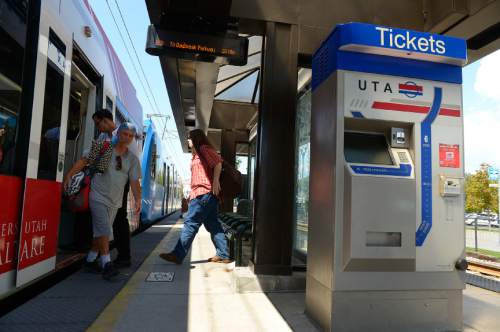This is an archived article that was published on sltrib.com in 2015, and information in the article may be outdated. It is provided only for personal research purposes and may not be reprinted.
Utah Transit Authority General Counsel Bruce Jones announced his retirement Wednesday and is leaving with a nice parting gift: a retirement payment that legislative auditors say is twice as generous as normal for UTA employees.
Jones had been headed toward a pension worth about $100,000 a year, instead of the $50,000 his 10 years of service credit normally would earn, given his salary, according to an audit last August.
Jones, 65, said he has now worked at UTA for 10 years and is retiring. He said in an interview that he doesn't have exact figures yet for his retirement pay, but said it is "maybe 10 percent less" than auditors had said — or about $90,000 annually.
His total compensation in 2013, the most recent publicly reported, was $384,472, including $222,835 in base salary, according to the audit.
Auditors said Jones' unusual contract "enables him to earn double credits towards a pension in his first 10 years of service."
Jones said he was offered the retirement benefit when he was hired "probably because I'm an old guy. Frankly the board said rather than pay you an increased salary, we would rather give you a retirement benefit. It came at their request and not mine."
When the legislative audit was released, then-Sen. John Valentine, an attorney who had just accepted a nomination as Utah Tax Commission chairman, said Jones' compensation was high in this market for "any general counsel, especially for a government agency. To put it in perspective, [his base salary] is over twice what my compensation will be as a chairman of the tax commission."
However, UTA released a compensation study Wednesday saying its compensation for the general-counsel position was within industry norms.
Jones — a former Salt Lake County Republican Party chairman and one-time Cottonwood Heights City Council member — said he plans to help out during a transition period with the newly hired UTA general counsel, Jayme Blakesley.
The UTA board approved hiring Blakesley on Wednesday. The University of Utah law graduate has been serving as an attorney for the U.S. Department of Transportation and the Federal Transit Administration, and was former deputy general counsel for TriMet, which offers transit service in Portland, Ore.
—
Compensation study • Announcement of Jones' departure came on the same day the UTA board said that a study it commissioned found agency pay for executives generally is within normal bounds for the industry, but the board also took steps to hold down pay for newly hired executives.
The board adopted a policy to set salaries for new executives at 90 percent of the labor-market median for their positions, and it will eliminate a 401(a) asset management plan for new hires. Its policy also allows comparison of both government and private corporate salaries in studies that help set wages.
Monica Whalen, president and CEO of Employers Council, said the new compensation study, which her company prepared for UTA, shows that its pay and benefits for executives is generally within norms for "relevant markets," or the types of jobs and locations that would compete for those executives.
However, she said the study found that retirement benefits are above normal. It also said that bonuses were higher than normal.
The board last year adopted a policy to hold bonuses to no more than $7,500. Some executives — including Jones and UTA President and CEO Mike Allegra — had been paid $30,000 in bonuses in 2013.
For Allegra's position, the compensation report said the CEO's base pay was "below the relevant labor market by 6 percent in 2013 and by 9 percent in 2014, including public sector, transit and local geographic data."
Allegra's compensation in 2013, according to the legislative audit, was $402,187 — including a base salary of $228,558.
The new compensation study said that while his bonus was above market norms, other benefits were within norms.
This study and moves to hold down pay and benefits for future executives — along with the departure of Jones — come after the Legislature authorized counties to ask voters to approve a sales-tax increase of a quarter-cent per dollar. The proceeds would be split by UTA, cities and counties for local transportation needs.
Lane Beattie, president and CEO of the Salt Lake Chamber, which has pushed hard for the transportation-tax increase, issued a news release saying "UTA has gone above and beyond in evaluating employee compensation" with its new report.



